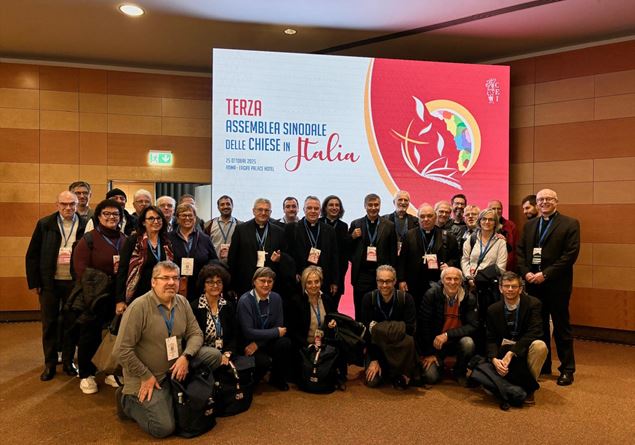Four years of walking, 200 dioceses and 500 thousand people involved, a document approved by a very large majority. The third synodal assembly of the Italian Church ended on 25 October at the Hotel Ergife in Rome. But what does this document really say? Let’s start with the numbers: the Document received 96 percent of favorable votes. A plebiscite.
But what does this document contain that has more or less agreed upon with everyone but which has also sparked several controversies, especially due to the request that the CEI support «with prayer and reflection the “days” promoted by civil society to combat all forms of violence and demonstrate closeness towards those who are hurt and discriminated against (Days against gender violence and discrimination, pedophilia, bullying, feminicide, homophobia and transphobia, etc.)». Many interpreted this proposal as support for Gay Pride.
We talk about it with Alberto Chiara, journalist, essayist and one of the over 800 delegates who participated in the synod assemblies. «It was the culmination of exactly four years of work», he explains, «a journey that began in the midst of the pandemic, with closed churches and empty oratories behind us. It physically involved over 500 thousand people: lay people, priests, bishops, experts but also people outside the Church. There are three interpretative figures: greater co-responsibility of the laity, greater training and attention to a series of concrete problems that challenge the lives of all of us”.
What are these concrete problems?
«Peace and war first and foremost. Poverty, development, relationships, including emotional and sexual ones which today are multiple and plural. Some newspapers have headlined it as if it were the only topic, but it is only one of many.”
You talk about “greater co-responsibility”. What does this mean in concrete terms?
«The bishops have received the mandate to make pastoral councils in the parishes mandatory. It means involving all the components of the Church more. I would say that a step forward has been made towards greater “internal democracy”, even if we know that the Church is not a Parliament. But there is a need to give a voice to more people. This is what co-responsibility means.”
What does the Document say on the topic of emotional and sexual relationships?
«That local churches and regional episcopal conferences are called to promote paths of accompaniment, discernment and integration in the ordinary pastoral care of all those people who come from wounded situations: separated, divorced and remarried, homosexuals, transgenders and their families».
It’s not about getting on the Gay Pride bandwagon, as some have said.
«None of this. The underlying message is clear: enough marginalization and stop discrimination. Point number 30 should be read for what it says. The controversies of recent days seemed misleading, instrumental and biased to me.”
Many new features concern the proposals on peace and disarmament.
«It is one of the first concrete propositions of the over one hundred that make up the Document. Point 24 invites the CEI to set up a reflection and in-depth discussion table involving “various realities of civil society and experts in the sector”. Which means government, Confindustria and unions. The Church poses an ethical problem: is it right that hundreds of billions of euros are spent to rearm and replenish the arsenals by cutting welfare, education and integration paths? The question is clear. Now we need concrete answers. In addition to the permanent table on disarmament, the assembly proposed the abandonment of the banks involved in the war industry supply chain, support for professional conscientious objection and restorative justice projects”.
There has been and is no shortage of criticism even within the Catholic world. The bishop of Sulmona, Michele Fusco, observed the lack of attention to the theme of the family. Is he right?
«Everything is perfectible, let’s be clear. And there are bound to be gaps. Everyone then brings their own sensitivity to it. The Document has chosen to incorporate all the richness and plurality of topics that the delegates of the dioceses have put on the table, including the family”.
You talk about “perfectibility”. What does it mean?
«First of all, we need to fill proposal 24 on disarmament with content. A signal has been sent, but concreteness is needed. And then there is the issue of style: Monsignor Erio Castellucci, archbishop of Modena and secretary of the synod path, said something beautiful: The Synod is closing and now the synod continues. A style has been delivered, a package of urgencies. Now it will be up to the bishops to decide which priorities to immediately put at the top of the list and which to leave to settle.”
When will it be decided?
«From 17 to 20 November the CEI, in its general assembly, will bring the attention of all the bishops to this document. They will be the ones to establish the priorities to put at the top of the list and the implementation times of the Document that we have approved”.


